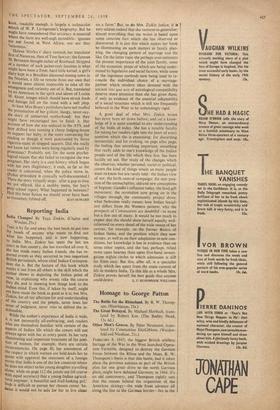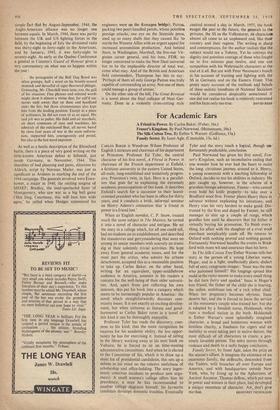Homage to George Patton
FEBRUARY 8, 1945; the biggest British artillery barrage of the War in the West launched Opera- tion Veritable, designed to destroy the German forces between the Rhine and the Maas. R. W. Thompson's thesis is that this battle, had it taken place the previous autumn as part of the British plan for one great drive to the north German plain, might have defeated Germany in 1944. It's an old controversy, and Thompson rightly sees that the reason behind the imposition of the American strategy—the wide front advance all along the line to the German border—lies in the simple fact that by August-September, 1944, the Anglo-American alliance was no longer one between equals. In March, 1944, there was parity between the UK and US fighting forces in the field, by the beginning of July the divisional ratio was thirty-eight to forty-eight to the Americans, and by January, 1945, it was forty-eight to seventy-eight. As early as the Quebec Conference a general in Cozzens's Guard of Honour gives a wry commentary on what was to happen within the year : . . . the protagonist of the Bull Dog Breed was often grumpy, half a mind on his brandy-soured stomach and throatful of cigar-flavoured phlegm. Grimacing, Mr. Churchill must taste, too, the gall of his situation. Fine phrases and selected words might show it almost a virtue that, far call'd our navies melt away; that on dune and headland sinks the fire; but those circumstances also kept him from the leading position. Except as a piece of politeness, he did not even sit as an equal. His real job was to palter. His field and air marshals, on short commons of men and machines, his admirals of the outclassed fleet, all nerves bared by close four years of war in the main unfortu- nate, supported him, courageously and proud, but also at the last word impotent.
As well as a hectic description of the Rhineland battle, there is a piece of very good writing on the little-known American defeat at Schmidt, just inside Germany, in November, 1944. This shambles of bad planning and panic, direction by Aldrich, script by Norman Mailer, was just as significant as Arnhem in marking the end of the 1944 campaign. The generals involved were Eisen- hower, a major in 1940, the smiling enigma of SHAEF; Bradley, the steel-spectacled hater of Montgomery, who saw war as a big ball game (`flot Dog, Courteney, this will bust him wide open,' he yelled when Hodges announced his
engineers were on the Remagen bridge); Patton, packing two pearl-handled pistols, whose pointless prestige attacks, one eye on the Stateside press, used up so many shells that they caused Ike `to startle the Western Allies with an urgent appeal for increased ammunition production.' And behind them, in Washington, Marshall, the five-star Vir- ginian career general, and his boss, FDR, no longer concerned to make the New Deal universal but to be the implacable director of total war, come what may. And of the British and American field commanders, Thompson has this to say : `Perhaps of them all only George Patton was truly capable of commanding an army. Not one of them could manage a group of armies.'
On the other side of the hill, The Great Betrayal is a novel about the final collapse of Nazi Ger- many. Done in a violently cross-cutting style
centred around a day in March, 1955, the book ranges the past to the future, the generals to the priVates, the SS to the Volkssturni; its characters almost all come to an unpleasant end, like their Country and their regime. The writing is sharp and contemptuous, for the author realises that the subject would tax a Tolstoy. Yet he conveys the dignity and pointless courage of those who fought on to five minutes past twelve, and one can sympathise with his Wehrmacht characters at the end of it all. But not with Peter Neumann's bunch in his account of training and fighting with the SS in Germany .and on the Eastern Front. This pretty nasty account of the methods and beliefs of these sadistic hoodlums of National Socialism would be considered despicably sensational if one did not realise his book is relatively restrained and his facts only too true. DAVID REES



































 Previous page
Previous page